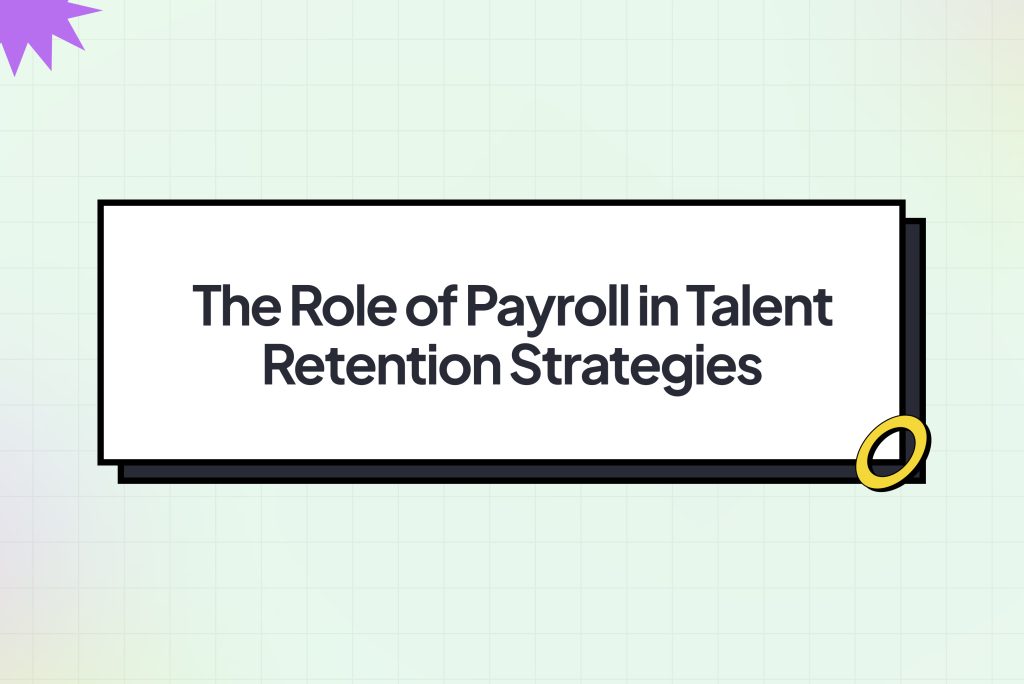
Talent retention is a key focus of many businesses as high turnover rates directly impact costs in recruitment and training, not to talk of wasted time invested in the entire process. This is why many businesses in Nigeria often look for talent retention strategies to keep good hires.
The truth is there are many strategies businesses can employ to keep employees long-term, but one of the more effective ones to consider is proper payroll management.
Payroll in talent retention strategies is often overlooked or generally mistaken for just more money for employees, but it can be much more than that, and that’s what we’ll be looking at in today’s blog piece.
Why Is Talent Retention a Top Priority for Businesses Today?
Talent retention has become a critical concern for businesses across Nigeria and beyond. High turnover rates don’t just disrupt workflow, they carry significant costs in recruitment, onboarding, and training new hires. Every time a skilled employee leaves, the organization loses not only the time invested in developing them but also the experience and institutional knowledge that can’t be replaced overnight.
This is why many companies are increasingly focusing on talent retention strategies. Keeping your top performers motivated and engaged reduces operational disruptions and helps maintain a competitive edge. Employees who feel valued are more likely to stay long-term, contributing to stronger company culture, higher productivity, and overall business growth.
While salary is an important factor, payroll in talent retention goes beyond simply paying employees on time. It encompasses accuracy, transparency, and consistency, elements that demonstrate respect for employees’ contributions and signal a business’s commitment to their well-being. Organizations that integrate payroll effectively into their talent retention strategies are better positioned to retain high-value talent and reduce turnover costs.
How Does Payroll Influence Talent Retention in Competitive Markets?

In competitive job markets, payroll plays a crucial role in talent retention strategies. Employees are not just looking for a paycheck, they want assurance that their compensation is accurate, timely, and reflective of their contributions. Payroll in talent retention isn’t just about increasing salaries; it’s about building trust and demonstrating reliability in how employees are treated financially.
Accurate and consistent payroll reduces frustration and anxiety, which are common reasons employees leave. Delayed or incorrect payments can quickly erode confidence in an organization, prompting top performers to explore other opportunities. Conversely, a well-managed payroll system signals that the company values its employees and takes their well-being seriously.
Beyond timeliness, payroll in talent retention also involves transparency and flexibility. Clear payslips, detailed breakdowns of deductions, and easy access to benefits help employees understand and appreciate the full value of their compensation package. In competitive markets, companies that leverage payroll as part of their talent retention strategies are more likely to maintain engagement, minimize turnover, and attract top-tier talent who value both fairness and reliability.
How Can You Include Payroll in Talent Retention Strategies?
Integrating payroll into talent retention strategies goes beyond simply ensuring employees are paid on time. Thoughtful payroll practices can directly impact employee satisfaction, engagement, and loyalty, key factors in keeping top talent within your organization. Here are several ways businesses can use payroll strategically to strengthen talent retention:
Timely and Accurate Payments
One of the simplest yet most effective ways to leverage payroll in talent retention is by ensuring that employees are consistently paid correctly and on schedule. Timely, error-free payments build trust and reinforce the idea that the company values its workforce.
Transparent Compensation Structures
Clear breakdowns of salaries, deductions, and benefits within payslips help employees understand the full value of their compensation. This transparency demonstrates fairness and fosters a sense of security, which is crucial for talent retention.

Integration of Benefits and Perks
ESS apps and payroll platforms can combine salary with benefits like health insurance, pensions, and allowances. Employees who see their total rewards clearly are more likely to stay engaged and committed, making payroll a central element of talent retention strategies.
Flexible and Personalized Payroll Options
Allowing employees to manage aspects of their payroll, such as advance requests, flexible payment dates, or benefit selections through self-service portals, empowers them and enhances satisfaction. Personalized payroll experiences show that the organization values individual needs.
Data-Driven Insights for Retention Decisions
Modern payroll systems provide analytics that can inform talent retention strategies. Tracking salary trends, benefits utilization, and payroll-related complaints enables HR to proactively address potential turnover risks and design more effective retention programs.
By embedding these practices into your payroll processes, businesses in Nigeria can strengthen talent retention, boost employee morale, and create a workforce that feels valued and supported. Payroll in talent retention, when done thoughtfully, becomes a strategic tool rather than just an administrative function.
5 Ways Payroll Benefits Your Overall Talent Retention Strategy
Payroll is more than just a process for paying employees, it’s a strategic tool that can significantly influence talent retention. By implementing thoughtful payroll practices, businesses can create an environment where employees feel valued, secure, and motivated to stay. Here are five ways payroll directly benefits your overall talent retention strategy:
Ensures Timely and Accurate Compensation
Consistent, error-free payroll builds trust. Employees are more likely to remain loyal when they know they will be paid correctly and on schedule, making payroll in talent retention a critical factor.
Enhances Transparency and Trust
Detailed payslips, clear deductions, and accessible benefit information help employees understand the full value of their compensation. Transparency fosters confidence in the organization and reinforces fairness.
Supports Employee Engagement
Integrating benefits and perks into payroll, such as health insurance, pensions, or allowances, demonstrates that the company cares about its workforce. Engaged employees are more committed and less likely to leave.
Enables Personalization and Flexibility
Modern ESS apps allow employees to manage aspects of their payroll, from benefit selections to flexible payment options. Giving employees control over their compensation experience improves satisfaction and retention.
Provides Data for Strategic Decisions
Payroll analytics can inform HR about salary trends, benefit utilization, and potential areas of dissatisfaction. This insight allows businesses to proactively address turnover risks and enhance talent retention strategies.
By leveraging payroll in these ways, businesses can create a robust talent retention strategy that goes beyond traditional incentives. Accurate, transparent, and employee-centric payroll practices help retain top talent, improve morale, and strengthen organizational stability.
Beyond Retention, How Does Payroll Affect Employee Morale?
Payroll isn’t just a tool for ensuring employees stay with the company, it plays a significant role in shaping workplace morale. Employees notice more than just the number on their paychecks; they pay attention to accuracy, timeliness, and transparency. Payroll in talent retention strategies is therefore closely linked to overall job satisfaction.

Consistently accurate and timely payroll demonstrates that the organization respects and values its employees’ contributions. When employees see their compensation processed correctly every month, trust in the company grows, reducing stress and fostering a positive work environment.
Transparency in payroll further enhances morale. Clear payslips, easy access to benefits information, and ESS apps that allow employees to monitor their own compensation provide a sense of control and fairness. This level of clarity reduces confusion, eliminates disputes, and empowers employees to focus on their work instead of administrative concerns.
Additionally, payroll systems that integrate rewards, bonuses, or performance-based incentives create a direct link between effort and reward. Employees are more motivated to perform well when they know their achievements will be recognized promptly and fairly.
In essence, payroll goes beyond retention, it is a key driver of employee morale, engagement, and overall workplace satisfaction. Businesses that prioritize payroll as part of their talent retention strategies create an environment where employees feel valued, motivated, and committed to the organization’s success.
Conclusion: Leveraging Payroll for Stronger Talent Retention
Payroll is a powerful tool in any talent retention strategy. Accurate, timely, and transparent payroll not only helps retain top talent but also boosts employee morale, engagement, and trust. Organizations that integrate payroll thoughtfully into their retention strategies are better positioned to create a motivated and loyal workforce.
For businesses in Nigeria looking to strengthen talent retention, Salario offers a reliable, compliant, and user-friendly payroll platform that simplifies processes, ensures accuracy, and empowers employees through self-service portals. By leveraging Salario, HR teams can focus on strategic initiatives while employees enjoy clarity, control, and confidence in their compensation.
Take action today, book a demo with Salario and discover how payroll can become a cornerstone of your talent retention strategy.
